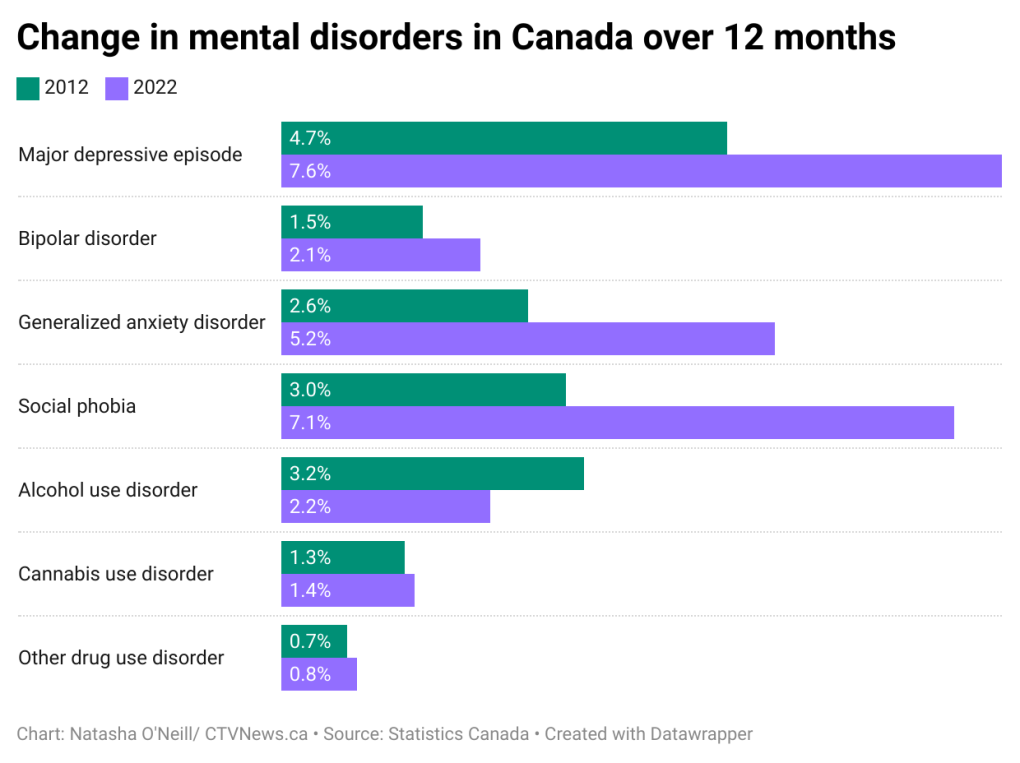
[ad_1]
More than 5 million Canadians skilled some type of psychological well being dysfunction in 2022, a brand new Statistics Canada examine has revealed.
StatCan says these Canadians “met the diagnostic criteria for a mood, anxiety or substance use disorder, with the prevalence of mood and anxiety disorders increasing substantially over the previous 10 years.”
In the examine, “Mental disorders and access to mental health care,” revealed Friday, the federal government company used knowledge from the Mental Health and Access to Care Survey to investigate the variety of Canadians who meet the standards for psychological well being problems, whether or not they have been recognized by a physician or not.
StatCan says the share of Canadians aged 15 years and older who’ve a generalized nervousness dysfunction doubled over a decade, rising to five.2 per cent in 2022 from 2.6 per cent in 2012.
The examine additionally discovered comparable will increase in individuals who reported a significant depressive episode within the final 12 months, as much as 7.6 per cent in 2022 from 4.7 per cent in 2012, and bipolar problems, which rose to 2.1 per cent from 1.5 per cent over the identical interval.
The largest will increase have been seen in ladies aged 15 to 24 years outdated — the prevalence of generalized nervousness dysfunction tripled and main depressive episodes doubled, StatCan mentioned.
While the examine notes knowledge on social nervousness or social phobia was not accessible in 2012, comparisons with knowledge from 2002 suggests an enormous enhance within the share of younger ladies with social nervousness, reaching 24.7 per cent in 2022 from 6.1 per cent in 2002.
StatCan says whereas a few of these will increase may be attributed to emphasize brought on by the COVID-19 pandemic, “the overall worsening of mental health among young people was observed well before 2020.”
 Change in psychological problems in Canada over 12 months. (Natasha O’Neill/CTV News/Datawrapper)
Change in psychological problems in Canada over 12 months. (Natasha O’Neill/CTV News/Datawrapper)
SUBSTANCE ABUSE
Despite a higher number of deaths caused by alcohol and accidental poisonings, including drug overdoses, the share of Canadians aged 15 years and older who met the standards for an alcohol use dysfunction analysis up to now yr fell to 2.2 per cent in 2022 from 3.2 per cent in 2012.
StatCan says the lower was pushed by adjustments in males aged 15 to 24 years outdated.
The share of Canadians who met the standards for hashish and different substance use problems remained comparatively regular, in response to the examine.
Across all racialized teams, the general prevalence of temper, nervousness and substance use problems different, StatCan mentioned.
“The prevalence was lower among Chinese, Filipino, South Asian and Black people in Canada, as compared with non-racialized, non-Indigenous people. Differences in prevalence could be related to socio-cultural differences in willingness to report symptoms of mental illness or related to the stigma associated with mental illness,” StatCan mentioned.
GETTING HELP
Just underneath half of Canadians aged 15 and older (48.8 per cent) who met the standards for a dysfunction up to now yr mentioned they’d spoken with a well being skilled about their psychological well being within the final 12 months.
According to the examine, these people have been extra prone to ask their household physician for assist, whereas smaller percentages reported speaking to a psychiatrist, psychologist or psychotherapist.
Counselling is the commonest type of psychological well being care in Canada (43.8 per cent) for folks with a psychological well being dysfunction. Medication (36.5 per cent) and psychological well being data (32 per cent) have been second and third commonest respectively.
Despite the recognition of counselling, folks have been most definitely to report feeling unhappy or having their wants unmet by counselling providers in comparison with those that took treatment or wanted extra data.
METHODOLOGY
The Mental Health and Access to Care Survey (MHACS) collects data on the psychological well being standing of Canadians, in addition to their entry to and want for providers and helps, whether or not formal or casual. This survey additionally goals to evaluate the influence of the COVID-19 pandemic on inhabitants well being and consider adjustments in patterns of psychological well being and using providers within the earlier 10 years. This evaluation is predicated on knowledge collected from March 17 to July 31, 2022.
MHACS used a modified model of the World Health Organization’s Composite International Diagnostic Interview to categorise folks with choose temper, nervousness or substance use problems. Although this isn’t a scientific analysis, this can be a standardized instrument that’s used to evaluate psychological problems in inhabitants surveys in response to the Diagnostic and Statistical Manual of Mental Disorders model IV (DSM-IV) standards.
For this examine, prevalence estimates for every dysfunction included whether or not diagnostic standards have been met inside the 12 months earlier than finishing the survey. This 12-month prevalence was used when evaluating using psychological well being care providers amongst folks with psychological problems.
For extra data on survey definitions and strategies, discuss with the Statistics Canada survey data web page: Mental Health and Access to Care Survey (MHACS).
If you or somebody you realize is in disaster or fighting dependancy or psychological well being issues, the next sources could also be accessible to you:
- Hope for Wellness Helpline for Indigenous Peoples (English, French, Cree, Ojibway and Inuktitut): 1-855-242-3310
- Wellness Together Canada: 1-866-585-0445
- Drug Rehab Services: 1-877-254-3348
- SMART Recovery
- Families for Addiction Recovery: 1-855-377-6677
- Kids Help Phone: 1-800-668-6868
- Canada Suicide Prevention Helpline: 1-833-456-4566
- Centre for Addiction and Mental Health: 1-800-463-2338
- Crisis Services Canada: 1-833-456-4566 or textual content 45645
- Kids Help Phone: 1-800-668-6868
- If you want fast help name 911 or go to the closest hospital
[adinserter block=”4″]
[ad_2]
Source link